Sub Programme Area 102
Fish for all Research and Training Centre (FRTC) completed a decade of service aimed at providing sustainable livelihoods and building the resilience of small-scale fishing communities; the centre commemorated the event on 26 December 2019 by launching three new initiatives with key partners. A memorandum of understanding (MoU) was signed with the National Bureau of Fish Genetic Resources (NBFGR), Lucknow, and the Centre of Advanced Study in Marine Biology, Annamalai University, Parangipettai, for research collaboration on marine and food fish species conservation. The Fisher Friend Mobile Application (FFMA) received the Mini Innovation Challenge Award from Global Resilience Partnership (GRP), Kenya. The centre initiated a new fishery improvement programme for flower shrimp to promote sustainable fisheries in the Palk bay region.
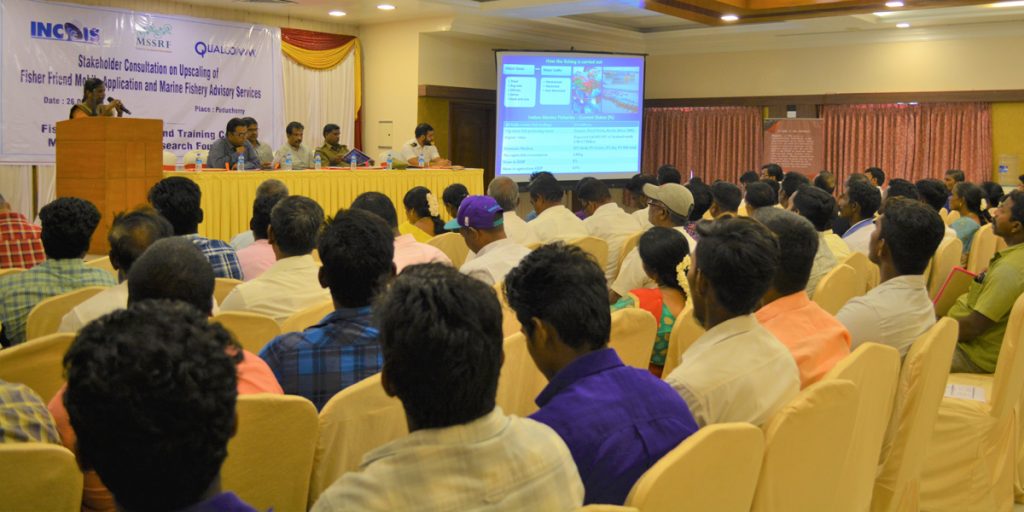
102.1 Capture Fisheries Resource Management and Enhancement
Fish for all Research and Training Centre (FRTC) completed a decade of service aimed at providing sustainable livelihoods and building the resilience of small-scale fishing communities; the centre commemorated the event on 26 December 2019 by launching three new initiatives with key partners. A memorandum of understanding (MoU) was signed with the National Bureau of Fish Genetic Resources (NBFGR), Lucknow, and the Centre of Advanced Study in Marine Biology, Annamalai University, Parangipettai, for research collaboration on marine and food fish species conservation. The Fisher Friend Mobile Application (FFMA) received the Mini Innovation Challenge Award from Global Resilience Partnership (GRP), Kenya. The centre initiated a new fishery improvement programme for flower shrimp to promote sustainable fisheries in the Palk bay region.
Fishery Improvement Programme in the Palk Bay Region: In collaboration with Tamil Nadu Fisheries Department and Central Institute of Fisheries Technology (CIFT), Cochin, the centre has started a flower shrimp fishery improvement programme (FIP) in the Palk Bay region to help the fishing communities preserve their fish stocks over the long term and also improve the global marketability of their catch given the increasingly high demand for sustainably caught seafood in global export markets. A working committee, involving key stakeholders, has been formed, and the first meeting was conducted during October 2019. Landing centre–specific awareness programmes were conducted in three specific landing centres to orient the fisherfolk on the importance of the Marine Steward Council (MSC) certification and sustainable fisheries. The project also initiated the development of a voluntary code of practice for sustainable harvesting of flower shrimp.
One of the working modules of the FIP involves conducting a series of observer programmes in the Palk Bay region to understand the bycatches and endangered, threatened and protected (ETP) species caught during flower shrimp fishing. The first observer programme was conducted during 10–15 February 2020 with CIFT in three selected fish landing centres (Rameswaram, Mandapam and Kottaipattinam) of the Palk bay region using different bycatch reduction devices (BRDs) in trawler boats. The BRDs include the turtle excluder device (TED), a specialized device that allows captured sea turtles to escape when caught in a fishermen’s net; and juvenile fish excluder cum shrimp-sorting device (JFE-SSD) in which the mesh sizes of the cod end used for the experiments are different – upper cod end is 40 mm square mesh and the lower cod end is 25 mm square mesh. The catch using BRDs is being compared with that using the control nets that are traditionally used by the trawler fisherfolk in the region for flower shrimp.
Monitoring of Wave Rider Buoys and Dissemination of Ocean State and Marine Fishery Advisory Services: All three shore stations in Colachel, Tharuvaikulam and Puducherry are functioning well and receiving data from respective wave rider buoys (WRBs), which in turn is transferred to Indian National Centre for Ocean Information Services (INCOIS) on an hourly basis. Overall, two WRB maintenance events, four redeployment events and two drift events were reported in these three locations during the reporting period. A community-based monitoring mechanism has been evolved to safeguard the WRBs in these locations. During the reporting period, the Puducherry shore station received data for 320 days while Colachel received data for 287 days and Tharuvaikulam for 355 days. Around 13358 fisherfolk (male: 12451; female: 1117) from 531 villages across Tamil Nadu, Puducherry and Andhra Pradesh were made aware of the functioning of INCOIS and its scientific services, especially ocean state forecast (OSF), high wave alerts, potential fishing zones (PFZs), tuna forecast, tsunami warning and other disaster alerts. A total of 73917 fisherfolk from 632 villages received information on OSF and PFZ on a daily basis through mobile-based information and communication technology (ICT) applications such as FFMA, voice and text messages, district-wise WhatsApp groups and GSM-based public address systems. A total of 190 village-level and one-to-one feedback meetings were organized and 190 feedbacks and 40 case studies collected from fisherfolk from 30 villages on the services provided. Documenting the traditional knowledge was done with 180 fisherfolk on parameters such as prediction of ocean state, fish availability and disasters for scientific validation. The INCOIS–MSSRF 24/7 helpline facility, available in Tamil, Telugu and Malayalam languages, was accessed by 3142 fisherfolk for information on various topics related to their profession.
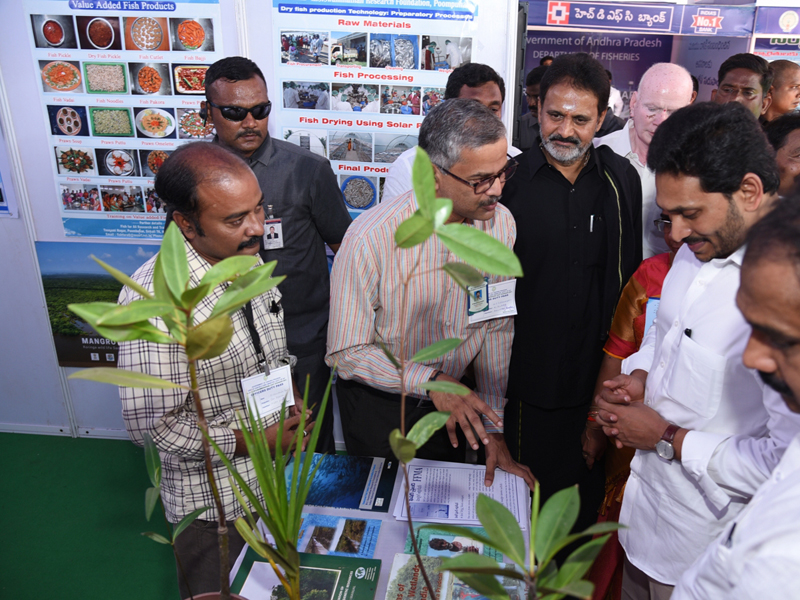
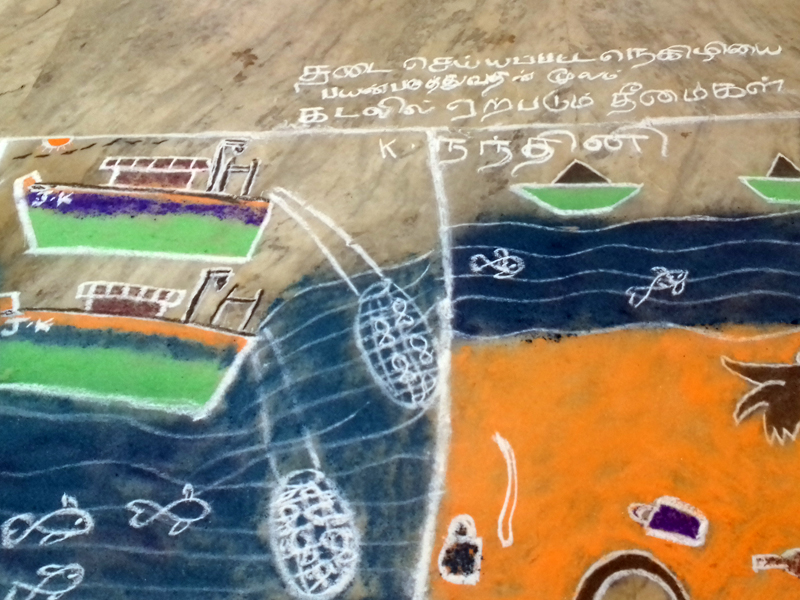
Fisher Friend Mobile Application: As
mentioned earlier, the FFMA won the Mini Innovation Challenge Award
from Global Resilience Partnership, Kenya, in November 2019. It was
identified as one of the novel solutions for building the resilience of
a small-scale fishing community. During the reporting period, four new
versions of FFMA were released via Google Play Store and one Fisher
Friend KaiOS version was released via JioStore. A total of 15984 new
users were added, and the application achieved 2080763 screen views.
Three new features requested by fisherfolk – tidal forecast, OSF map
and automated weather forecast – were integrated into the application.
Three state-level 1-day consultations, involving key stakeholders from
Tamil Nadu, Andhra Pradesh and Puducherry, were organized to discuss
ways of improving the user interface of FFMA and a set of actions
evolved for improvement of the app. Based on this, a joint action plan
was developed with scientists from INCOIS for addressing the additional
data requirements for improving the user interface of FFMA.
A
total of 40 fisherfolk have been selected as FFMA ambassadors and
provided with tablets for promotion of the app. Moreover, 724
village-level meetings, 2 district-level awareness meetings and 8 mass
campaigns were conducted in which a total of 21282 fisherfolk
participated. Seven district-level advisory committee meetings
recommended policy advocacy to enhance offshore network coverage and
also shared ideas on engaging with the government to increase the use
of FFMA. A total of 319 feedbacks and 62 case studies showcasing the
economic and livelihood benefits of the users were documented. High
dependency of users on the GPS, OSF and PFZ data was observed. Using
purposive sampling, success stories of 214 fisherfolk (120 motorized
and 94 mechanized) were recorded. The increased income of small-scale
motorboat fisherfolk was in the range of Rs 3000–5000 based on FFMA
information regarding their catch; in the case of fisherfolk using
mechanized boats, this was in the range of Rs 10000–15000. Timely
facilitation through the FFMA also helped save assets and lives of 152
fisherfolk from across seven states.
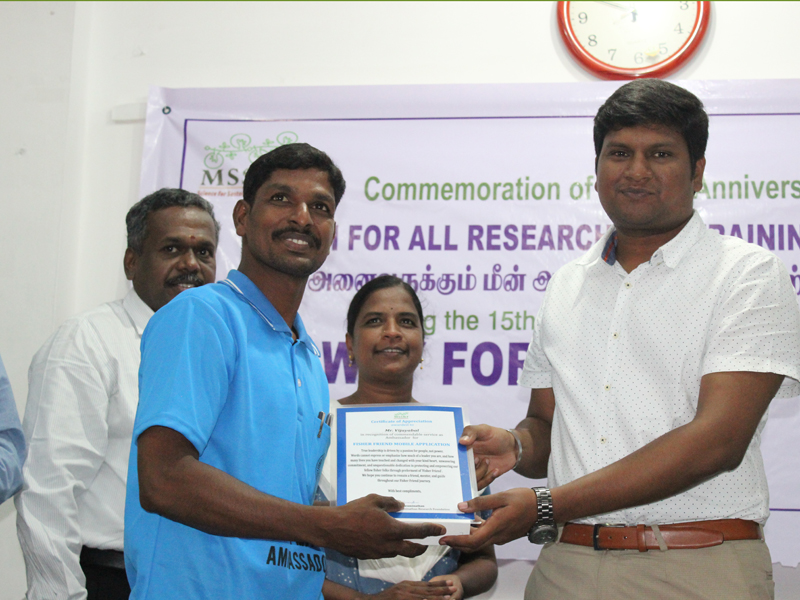
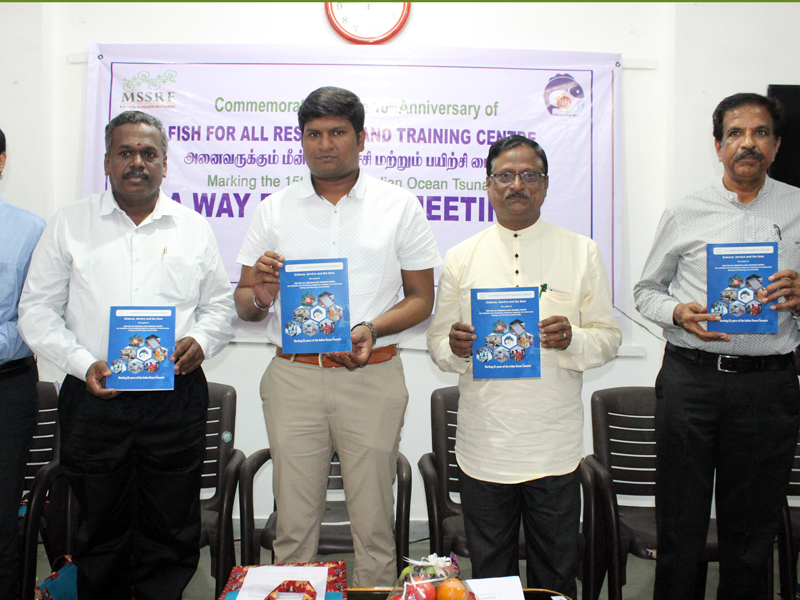
Development of Village-Level Fisheries Resource Management Plan: FRTC promotes participatory management of fishery resources involving the resource user’s community for promoting sustainable livelihood and disaster risk reduction under the Fisheries Management for Sustainable Livelihoods (FIMSUL) II project of the government of Puducherry. Village-level co-management committees have been constituted and strengthened in 18 fishing villages. In order to strengthen the livelihood options for fisherfolk, a village-specific livelihood assessment study covering all fishing villages in Karaikal and Puducherry districts was conducted using the five capital (natural, human, social, financial and physical) sustainable livelihood approach. A village-level fishery resource management plan, involving the co-management committee members, was developed in 10 villages of Karaikal district.
Artificial Reefs: A community-based artificial reef programme in collaboration with Tamil Nadu Fisheries Development Corporation (TNFDC), the government of Tamil Nadu, was launched on 26 December 2019 in Poompuhar village. A total of 60 individual reef concrete modules weighing 72 tons were constructed with three different designs – for lobsters, groupers and small fishes. A village-level marine council is in place to monitor fabrication and designing of reef modules; a district-level advisory committee has been formed to monitor project activities.
102.2 Post-harvest Management
Fish Processing Unit: This unit processed about 3.5 tons of different fish species for dry fish production and other fish by-products. Overall, 700 kg of hygienic dry fish and 100 kg of other value-added products maintaining HACCP standards were produced by SHGs of fisherwomen. Forty female members of SHGs were involved in production and packaging, and they earned Rs 90155 in all. For secured marketing of the products produced by the women, an MoU was signed between FRTC and Hexitro Private Ltd, Tharangambadi. With the support of NABARD Livelihood Development and Enhancement Programme (LEDP), a 7-day training programme on fish processing and post-harvesting technology was conducted for 30 women from five SHGs for the production of new products and advanced fish processing techniques.
102.3 Culture Fisheries Enhancement and Management
Promoting Integrated Fish Farming System: The centre is promoting and popularizing integrated fish farming system (IFFS) among fish farmers in Sirkazhi and Sembanarkovil blocks. A total of 30 small fish farmers selected as master trainers were trained on various aspects of integrated fish farming through structured training, followed by demonstration in the field. For this purpose, a model integrated fish farm has been established in the FRTC, where cultivation of fodder crops, paddy and vegetables, floriculture, fish culture, Azolla culture and so on are integrated. After training and demonstration, component-wise inputs were distributed to all the 30 farmers for replicating this in their farms. A total of 42000 fish fingerlings were given to these farmers for farming in 9.33 acres of fish ponds; vegetable cultivation was started in 1.5 acres and cumbu napier fodder grass planted in 2.5 acres. For further popularizing the concept among the farmers, 30 integrated fish farms were established in 30 villages of the two blocks. A partial harvest was made by harvesting 762 kg of fishes and an income of Rs 114300 earned by 9 farmers. The vegetable yield of 1.4 tons over 3 months yielded a profit of Rs 28618 or an average income of Rs 950/farmer for 30 farmers. Fodder yield of about of 20 tons benefitted 20 farmers with an average income of Rs 750/farmer. All the 30 farmers are harvesting nearly 2 kg Azolla/week and using it as fish feed, which has reduced the expenditure on fish feed.
102.4 Training and Capacity Building
Training Centre: During 2019–20, 46 training programmes on co-management of fishery resources, establishment of artificial reefs, use of square mesh for responsible fishing, fish processing and preservation technology and integrated fish farming system were conducted; about 1368 farmers participated in these programmes. The details of these programmes are given in Table 1.
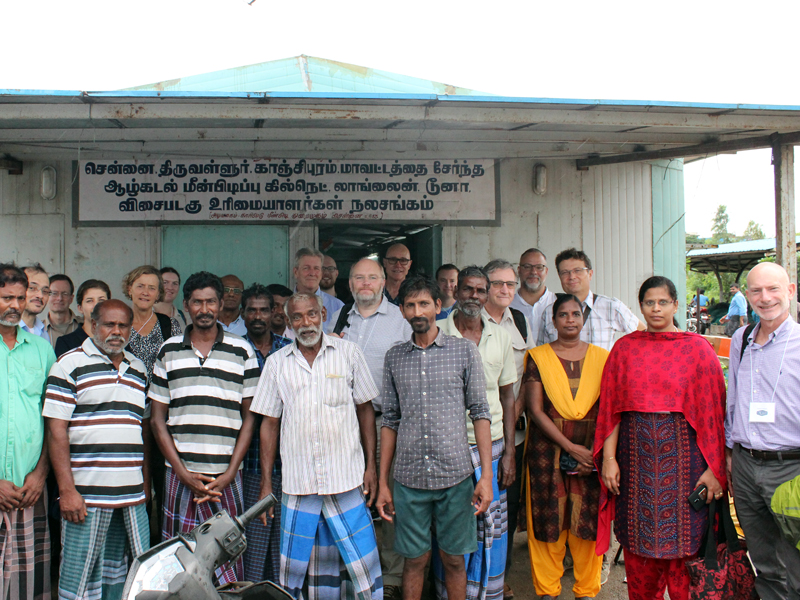
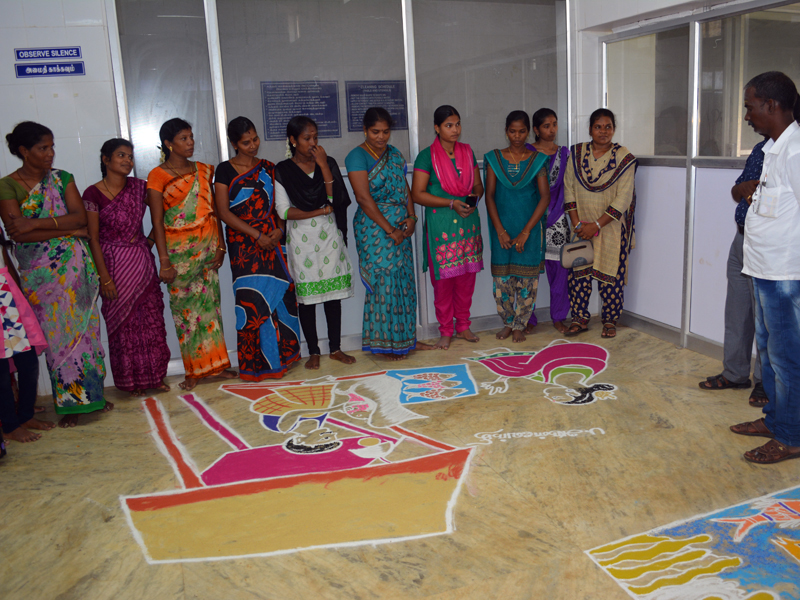
| S. no. | Training topics | No. of programmes | Participants | Total | |
| Male | Female | ||||
| Co-management of fishery resources | 17 | 228 | 206 | 434 | |
| Artificial reef and its importance | 1 | 55 | 0 | 55 | |
| Fish value-added products | 6 | 0 | 294 | 294 | |
| Square mesh for responsible fishing | 1 | 15 | 0 | 15 | |
| Integrated fish farming | 11 | 290 | 9 | 299 | |
| Quality dry fish production | 2 | 0 | 60 | 60 | |
| GPS and troubleshooting | 4 | 100 | 0 | 100 | |
| Diesel engine mechanism | 4 | 120 | 0 | 120 | |
| Total | 46 | 808 | 560 | 1368 |
Table 1: Training programmes organized under FRTC (2019–20)
Village Resource Centre: Two village resource centres (VRCs) and two village knowledge centres (VKCs) are operational under FRTC. (See Table 2 for details.) During the reporting period, the VRCs developed and disseminated 258 content pieces on marine biodiversity conservation and sustainable fishing methods using ICTs. An online course on dry fish production was conducted by the Thangachimadam VRC in Ramanathapuram district with FRTC Poompuhar and 13 fisherfolk participated. A total of 32 audio-conferences and 12 phone-in programmes on diesel engine repair, GPS handling, vegetable cultivation practices, pest management in paddy cultivation, cattle care and management, and nutrition awareness were conducted through VKCs and VRCs, which benefitted 912 users. Tele-medicine programmes were conducted in all VRCs and VKCs; these connected the users to doctors from Apollo Hospital and benefitted 520 users.
| Name of the VRC/VKC | Total users | Male | Female |
| Poompuhar VRC | 328 | 194 | 134 |
| Thangachimadam VRC | 515 | 263 | 252 |
| Keezhapoothanur VKC | 918 | 429 | 499 |
| Pannithittu VKC | 544 | 189 | 355 |
| Total | 2315 | 1075 | 1240 |
Table 2: VRCs and VKCs – user details (2019–20)
Clean Seas Campaign: In collaboration with National Centre for Coastal Research (NCCR), Chennai, FRTC organized International Coastal Clean-Up Day 2019 at Poompuhar, Rameswaram Sangumal and Kodiyakarai beaches on 21 September 2019. The focus of the programme was to create awareness among the fishing communities, beach visitors and general public on the importance of a pollution-free coast and acting as better stewards of our coastal and marine environment. A total of 369 volunteers participated in the clean-up of the three beaches. They collected debris to a distance of about 1 km. The total debris from all the beaches, amounting to about 4.20 tons, included plastic bags, bottles and cups (750 kg), glass bottles (789 kg), cloth (156 kg), ropes (332 kg), boat discards such as thermocol and nets (247 kg), footwear (133 kg) and others (1613 kg). The segregated debris was handed over to the municipality in each location for proper disposal.
World Fisheries Day: The training centre in collaboration with the Fisheries Department of the government of Tamil Nadu organized an event with the theme ‘Save the Ocean and Save the Nation’ on 21 November 2019. Various competitions focusing on sustainable fisheries were held prior to the event. A rally was held with 200 students and 50 fisherfolk emphasizing the vulnerability of the coastal area and seeking public attention for its protection. A half-day consultation was also organized at FRTC in which experts from various institutions participated and details about the importance of sustainable fishing, technologies and need for collective action for the conservation of marine resources were exchanged.
Study Tour for Seafood Managers: FRTC facilitated a 1-day study tour for seafood managers from 16 countries as part of a 10-day programme by the Sustainable Ocean Leadership Institute (SOLI) to understand the impact of climate change on the Indian seafood industry, organized by the Gulf of Maine Research Institute (GMRI) working with the Global Aquaculture Alliance in October 2019. The main purpose was to understand the perceived and real impacts of climate change on coastal communities, including aquaculture and fisheries production, vulnerability, resilience and response (if any) of these communities to climate change, particularly in response to variation in aquaculture and fisheries production and the complexity of seafood production in India. The study tour offered participants an opportunity to: (1) have first-hand conversations with fisherfolk and those running aquaculture operations to learn what changes they have seen in their occupation between the past and now, and (2) meet with local scientists to learn what kinds of mitigation and research are being undertaken in India.
